The 2020 hopeful used bogus statistics to change the way colleges treat students accused of sexual assault.
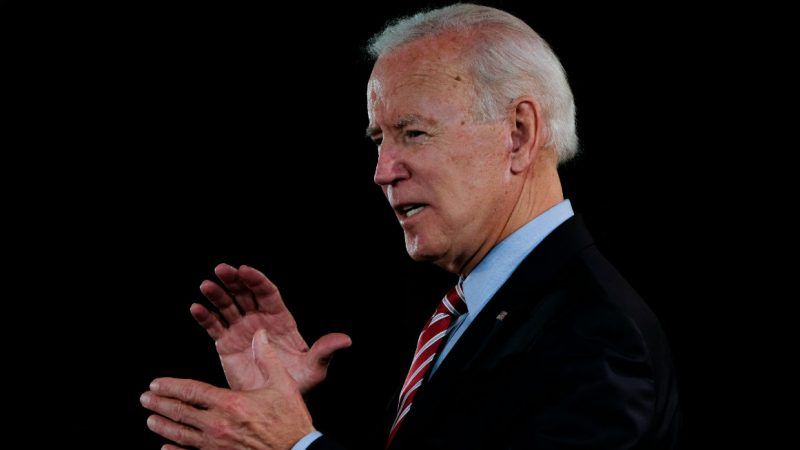
The rationale for the 2020 candidacy of former Vice President Joe Biden, a man who will be 78 years old on Inauguration Day, is that he is the great moderate hope. He is the man who will save the Democrats from their ever-leftward impulses by attracting the centrist voters who remain the majority of the electorate. But the key domestic initiative of his vice presidency was not middle-of-the-road at all. It was a declaration that the federal government must engage in a far-reaching, top-down intervention in the sexual interactions between young adults, setting new rules aimed at how students must behave and establishing harsh punishments for those who deviate.
Though his reputation rests on his moderation, Biden’s approach to campus sexual assault is part of a pattern: He identifies an actual problem, engages in inflammatory—and sometimes false—rhetoric about it, then fashions a harsh, overreaching response that sweeps up the harmless and even the innocent. He has been called to task on the consequences of this approach to the federal wars on drugs and crime. (As a senator, he was a key figure in overseeing comprehensive drug and crime legislation.) Over the years, and especially since announcing his presidential run, he has repudiated some of the policies he previously promoted.
But he continues to tout his work on campus sexual assault. He boasted about it at the second presidential debate. How did Biden come to advocate such extreme policies on this topic? And if he were elected, what would it mean for how he would govern?
An analysis this spring in The Chronicle of Higher Education gives Biden full credit for the campus reforms. “Advocates say the sweeping Title IX changes that have transformed higher education would not have happened without Biden’s support,” the Chronicle notes. (Title IX is the federal law that prohibits sex discrimination in education.) Campus security consultant S. Daniel Carter, who worked with the vice president on these issues, said, “This movement would not exist without Joe Biden.”
In response to Obama administration guidance, definitions of sexual misconduct on campus have become so expansive that virtually any word or touch that could be construed as sexual can be grounds for punishment. “Affirmative consent,” ardently advocated by Biden in numerous college speeches, became the widespread rule on campus (and the law for students in California, Connecticut, and New York). This means that each touch, each time, even between established partners, requires explicit—preferably verbal, preferably enthusiastic—consent.
With the arrival of #MeToo, Biden’s oft-stated desire to see campus policies spill into broader society got immediate traction. (It was no small irony that shortly before announcing his presidential run, Biden was accused by several women of unwanted touching, finding himself in the middle of the cultural detonation he helped set off.)
The work began with the worthy desire to stop sexual assault from happening to college women, and with the recognition that college administrators had too often failed to properly respond to students who sought their help. No one can doubt Biden’s passion for this cause, or his sincerity. But the reforms he championed were built on alarming rhetoric, dubious statistics, the presumption that the accused (virtually always men) are guilty, and a systematic gutting of students’ civil rights.
As the administration’s point man, Biden traveled the country, speaking to college officials and students, painting a grimly dystopian portrait of campus life in which inherently violent male students abuse their female classmates with impunity. One of his most frequently repeated phrases to college students is, “The greatest sin is the abuse of power, and the cardinal sin of them all is for a man to raise his hand to a woman.” He frequently told the story of Marla Hanson, a model whose face was slashed in 1986 in New York City by thugs hired by her landlord after she rebuffed his advances, and who was subjected to a brutal cross-examination at the criminal trial of her attackers. Biden used her case not only to illustrate the kind of peril young women confront, but the denigration female students can expect from officials if they report an assault.
He has often described, as he did to Teen Vogue in 2017, parents’ fears when they drop their daughters off at college. “Most parents don’t drive away saying, ‘Is she going to do all right in school? Is she academically qualified? Will she show up for class?’” he said. “That’s not the conversation going on. The conversation that’s going on is, ‘Is she going to be safe?’”
But Biden’s portrait is at odds with the copious record on how the majority of Title IX cases unfold. These generally begin as consensual encounters and, often because of alcohol and miscommunication, end up in dispute.
In a speech at the University of Pittsburgh in 2016, Biden said no one, not even a court of law, had a right to ask a woman reporting a sexual assault “Were you drinking?” or “What did you say?” Biden is an attorney and was the chairman of the Senate Judiciary Committee. Surely he knows that anyone investigating or adjudicating a sexual misconduct accusation must seek to ascertain what happened. Both the accuser and the accused must be questioned. Questioning should be done with care and respect. But how much an accuser has had to drink is often a crucial point—establishing the degree of intoxication can distinguish between whether the accuser had the ability to consent or not. Asking what an accuser said during a disputed encounter is the basic responsibility of any investigator.
Biden’s rhetoric set the tone for the administration’s approach, and it helped lead to policies that failed to uphold even the most basic rights of the accused.
An ‘Epidemic’ of Sexual Violence
When Biden become vice president in 2009, campuses were not on his agenda but domestic violence was. He was the author of the 1994 Violence Against Women Act, which he has called his “proudest legislative accomplishment.” One of his early acts as vice president was the appointment of Lynn Rosenthal, an expert on domestic violence, to be the first White House advisor on violence Against women. Her mandate was broad but vague. Among other things, she was to work with the Departments of Justice, Health and Human Services, and State on gender violence issues; there was no mention of the Department of Education or college campuses.
Then, in February 2010, NPR and the Center for Public Integrity jointly broadcast and published a series called “Seeking Justice for Campus Rapes.” It presented a horrifying portrait of “colleges’ failure to protect women” and the dismal treatment female students received from campus administrators.
The series slammed the Department of Education’s Office for Civil Rights (OCR). One headline was “Lax Enforcement of Title IX in Campus Sexual Assault Cases: Feeble Watchdog Leaves Students at Risk, Critics Say.” Russlynn Ali, Obama’s first head of OCR, was quoted saying that lenience on campus sexual assault was a Bush administration legacy that was about to change. The series gave the administration a focus for doing something big about women and violence.
As Biden later related in a 2016 interview in Mic, then–Education Secretary Arne Duncan “came to the president and me and said, ‘I’ve got an idea. Let’s use Title IX.’” And so, through 2010 to early 2011, the administration began formulating its campus effort. Lynn Rosenthal began meeting with academics who studied campus sexual assault. Student activists were invited to a Washington policy meeting and a reception at Biden’s home. But college administrators who handled sexual misconduct complaints were left out of the loop, and they didn’t seek input from civil liberties groups, defense lawyers, or others whose views might clash with activists’.
The work culminated in Biden and Duncan’s April 2011 announcement of sweeping new changes that were to affect the more than 4,600 institutions of higher education in the country. (NPR took credit for the new policy.) Biden has said repeatedly that the administration was compelled to act because of an “epidemic” of sexual violence, citing a statistic that “one in five” female college students would experience sexual assault before graduation.
That number came from an anonymous 2007 online survey of students at two universities. The definition of sexual assault was broad, encompassing everything from nonconsensual sexual intercourse to such unwanted activities as “forced kissing,” “fondling,” and “rubbing up against you in a sexual way, even if it is over your clothes.” The lead author, Christopher Krebs, told me in 2014 that because of the limitations of this single survey, “We don’t think one in five is a nationally representative statistic.” (Since then, other surveys, using comparable definitions of sexual assault, have returned similar findings.)
The administration’s new rules were initially declared in what’s known as the “Dear Colleague Letter,” a 19-page document from OCR laying out the changes the administration demanded of every school. This and other subsequent guidance created on campuses a far-reaching parallel justice system for sexual misconduct.
Inflated Numbers
Over the years, Biden has also told his own origin story of the Obama administration’s sweeping response to campus sexual assault. Since the passage of the Violence Against Women Act, Biden has often noted that the reported incidence of domestic violence in this country has fallen more than 60 percent. Biden said he wanted to get a picture of the incidence of violence against women in general, so he sent a top aide, Cynthia Hogan, to look at the numbers from the Bureau of Justice Statistics (BJS). Hogan came back, he told Mic, with “a devastating piece of information.” She found, he said, that “women between the ages of 14 and 24—we’ve made no progress. One in four on college campuses were being raped back then, or assaulted, the same way now.” In a speech this past March, Biden described his frustration at learning that for young women, “Nothing had changed since I drafted the law almost two decades earlier.”
But the findings from the BJS, a division of the Department of Justice, show just the opposite of what Biden describes. Nationally, violent crime peaked in 1991, then began its historic decline. Far from being unaffected by this drop, young women greatly benefitted from it. A BJS report titled Female Victims of Sexual Violence, 1994–2010 shows that during that period, sexual violence against females aged 12 and above declined 64 percent. Another BJS study, Rape and Sexual Assault Victimization Among College-Age Females, 1995–2013, found that during the period studied, rape and sexual assault rates for women in college fell by 50 percent, with the most significant drop occurring during the first 10 years. The report also found that young women not attending college experienced a higher rate of sexual crime than those enrolled.
A political scientist at Boston College, R. Shep Melnick, analyzed the statistics in his book The Transformation of Title IX. He notes that the BJS report on women enrolled in college found that the rate of assault was 2.44 percent, about a tenth of the one-in-five number asserted by the administration. (When Biden refers to the BJS data, he has consistently and mistakenly substituted the results from the Krebs study.)
Sexual assault statistics are notoriously hard to gather and vary widely. Critics of the BJS numbers say their methodology results in a severe undercount; critics of the administration’s one-in-five assertion say the number is wildly inflated. Putting aside critiques of methodology, the BJS findings do provide a long-term, generally consistent data set, giving credence to the finding that college-age women, like other members of the population, have indeed benefited from the dramatic decline in crime.
It’s not clear where Biden’s misunderstandings came from, or why he kept asserting them without being corrected. It is true that the BJS statistics find that younger women are more likely to be victims of sexual crime than older ones. Young people, both male and female, are more frequent victims of crime across the board. It certainly makes policy sense to focus on this population. Both Hogan and Rosenthal have made public statements about presenting Biden with data showing young women are more likely to be victims of sexual crimes than older ones—but in these statements, neither asserted that statistics on crime against younger women hadn’t changed since the 1990s. (Hogan and Rosenthal each declined to comment for this story. Biden’s campaign did not respond to multiple requests for comment.)
Biden’s incorrect and hyperbolic declarations about sexual assault numbers have had serious consequences. These alarming claims became a catalyst for Biden and the entire administration—and now the entire Democratic Party—to embrace highly punitive treatment of accused students. Evan Gerstmann, a political scientist at Loyola Marymount University and the author of Campus Sexual Assault: Constitutional Rights and Fundamental Fairness, wrote in one article that the one-in-five assertion was “the kind of number one would expect in a war zone.” He noted it created “an atmosphere of panic” that was used to justify “the undermining of certain basic principles such as the presumption of innocence and a fair process prior to such drastic punishment as expulsion.”
Activists Get Their Way
A small number of young women activists drove many of the policy changes the Obama administration embraced. With an entrepreneurial spirit, they founded their own advocacy organizations: SurvJustice, Know Your IX, and End Rape on Campus. The women provided policy guidance and some testified before Congress and were guests at the Obama White House. Melnick describes in his book how the young founders of these groups made themselves players in Democratic politics, and how they effectively used traditional and social media to bring attention to their cause.
Powerful people readily took their cues from these young leaders. A longtime OCR investigator who retired before the end of Obama’s second term told me that the advocates really had “the administration’s ear. The Know Your IX people—the administration jumped when they spoke.”
One of the central goals of activists was to get the government to publicly embarrass schools by releasing a list of those being investigated by OCR for possible mishandling of Title IX complaints. As Alexandra Brodsky, a founder of Know Your IX, wrote: “Little motivates a school quite like some good old-fashioned shaming.” In a Tumblr post, Know Your IX leaders described a February 2014 meeting in Washington with top administration officials, including Rosenthal and the new head of OCR, Catherine Lhamon. The activists wrote that the Education Department “is worried that releasing the names of schools under investigation before the conclusion of the investigation would unfairly publicly tar schools’ reputations. We of course expressed our disagreement.”
The young women were most persuasive. At the April 2014 announcement of the White House Task Force to Protect Students from Sexual Assault, many activists were in attendance. Arne Duncan affirmed they had shaped administration policy. He said, “Without your collective leadership, this sea change simply would not be happening.” Biden hugged activists and said in his speech that fighting violence against women was “the passion of my life.” (Some of the activists Biden interacted with over the years, offering hugs and other physical comfort, spoke out this year saying his touches had been unwelcome.)
The public shaming the activists sought, and officials initially resisted, came in the form of OCR’s May 1, 2014, release of a list of the 55 schools then under investigation. By the time Biden was ready to leave office, the number of schools on the list had grown to 223.
‘See Something, Hear Something, Know Something, Say Something!’
After the release of the Dear Colleague letter and the other guidance that followed, schools drastically expanded prohibited behavior. As Melnick wrote, schools variously banned unwelcome “flirting,” “jokes of a sexual nature,” “innuendo,” “gestures,” and causing “embarrassment.” Being found responsible for harassment did not require an intent to harm or even to have directed the prohibited behavior at a specific person.
Young men began being investigated, adjudicated, and suspended or expelled for sexual encounters that all parties agreed began consensually, often assisted by alcohol, and that ended with differing perceptions—the cases often hinging on whether affirmative consent had been obtained for every act. It was not unusual for complaints to be brought weeks, months, even years after the episode. It was common for the accused not to be told the specific charges against him, not to be able to testify in his own defense, and not to be able to present exculpatory evidence and witnesses.
Biden can be given credit for being a job creator. Responding to administration demands, a vast new industry was created of on-campus Title IX professionals—Harvard has more than 50—and outside consultants. Peter Lake, a law professor at Stetson University and an expert on higher education law, estimates that colleges and universities have spent at least $100 million complying with the Obama administration’s demands. Title IX offices became powerful bureaucracies; Lake says federal mandates gave these officials “unprecedented” power. Schools desperate to avoid the wrath of Obama’s OCR, whose investigations had become grueling, multi-year procedures, sought to increase the number of punished students.
A Homeland Security–style regime of constant surveillance and reporting was encouraged; Drexel University’s Title IX office adopted the motto: “See something, hear something, know something, say something!” This approach was codified in the 2014 bystander education program, It’s On Us, which Biden says he came up with and recommended to Obama. With the specific goal of involving men on campus, it encourages students to take a pledge (more than 440,000 have) and earn a photo ID badge after they promise to, among other things, “Look out for someone who has had too much to drink,” “Call non-consensual sex what it is—rape,” and “Always be on the side of the victim.”
It is of course laudable for students to look out for each other, especially when people are intoxicated. But schools also encouraged hearsay and rumors to be reported to Title IX offices. As a result, male students have been punished on the basis of third-party accounts, sometimes over the vehement objections of their female partners.
Biden seemed oblivious to how his policies were unfolding, sticking instead with his portrait of violent men and callous administrators. In his 2016 interview in Mic, he asserted that college presidents have consistently suppressed the number of Title IX reports on their campuses, often failed to provide any training for students about Title IX (such training is required by federal law), and neglected to provide any support or counseling for those reporting they were victimized. In his March speech this year, he said, “The more prestigious the college, the less they did.” No doubt there are schools that have mishandled, and continue to mishandle, Title IX complaints. But his description is at odds with well-documented reality.
As the Obama administration’s Title IX directives multiplied, increasing numbers of critics, especially in law and academia, expressed grave concerns about what was happening on campuses. Members of the law faculties at Harvard and the University of Pennsylvania issued open letters demanding due process and fairness for the accused. The Foundation for Individual Rights in Education (FIRE), the American Bar Association, and the American Association of University Professors, among others, issued reports warning that the procedures were becoming so lopsided against the accused as to undermine their legitimacy. A group of mothers of accused sons founded Families Advocating for Campus Equality, to provide support for families of accused students and to advocate for changes to Title IX procedures.
Young men found responsible for sexual misconduct on campus have increasingly turned to the courts, filing civil suits against their schools, claiming they were unjustly punished and their educations ruined. More than 500 such civil suits have been filed, and of those that have received rulings from federal judges, the majority have been found in favor of the young men, with judges sometimes issuing scathing condemnations of school policies. U.S. District Court Judge F. Dennis Saylor wrote in response to a case brought by a student at Brandeis University, that the proceedings were “closer to Salem 1692 than Boston, 2015.”
Eventually, Obama administration officials met with a small number of critics, including people from FIRE and a group of concerned law professors, but the meetings had little effect. During his vice presidency, Biden effectively ignored such detractors. He continued his incendiary rhetoric, voiced no awareness of the challenges to his policies in the courts, and expressed no interest in a course correction.
Good Intentions Gone Awry
As the Obama years came to a close, officials went on victory tours to tout their accomplishments. Given the breadth of the changes on campus the administration brought about, one would have expected Biden to celebrate this success.
Instead, he made his work sound like a dismal failure. Days before the end of his term, he wrote an open letter to college and university presidents and other academic leaders and disparaged their efforts to stop campus sexual assault. He asked them, “Have we made sufficient progress to protect students and change attitudes on your campuses?” The answer was a clear no. Statistics on campus sexual assault remained unchanged, he declared, despite the administration’s concerted five-year effort. Biden had come to describe campus sexual assault as nearly impervious to improvement. In the 2016 Mic interview he said, “This is a toxin on college campuses.”
Then, in September 2017, Secretary of Education Betsy DeVos announced her intention to reform federal Title IX policy. She said what had been created was a “failed system” that brought justice neither to the accuser nor the accused.
Biden and virtually the entire Democratic Party responded with outrage. Unlike the Obama administration, whose reforms rested on a series of “guidance” documents, the Trump administration is going through the lengthy process of making its Title IX counter-reforms into federal regulations. While schools await release of these final rules, many college presidents and other campus officials have vowed to be a resistance force.
In a phone call to activists shortly after the DeVos announcement, arranged by It’s On Us, Biden angrily dismissed the notions that the accused have been treated unfairly and that male students have been “vilified.” He called critics of his policies “cultural Neanderthals.” He urged the activists to organize to prevent their college presidents from making any Title IX reforms. Picking up the language of the activists themselves, he recommended shaming and embarrassing the school leaders. Biden said, “Please, please remember: Shame, shame, shame is a powerful weapon in our fight.”
Since Biden announced his third presidential run, there have been hard examinations of the consequences of the laws regarding crime and drugs that Biden pushed as a senator during the 1980s and ’90s. A Politico story by Zachary Siegel shows Biden’s long record of incendiary rhetoric and bogus assertions about drugs. The laws he pushed instituted excessive punishments, led to mass incarceration, and vastly increased racial disparities in prosecution. Those efforts also failed to end drug use. Over the years Biden has been forced to acknowledge much of this and has expressed some remorse.
The New York Times has looked at Biden’s Senate work on federal crime legislation, noting that he used to trumpet his tough-on-crime stance. But now he has released proposals that would undo some of the harsh responses he helped put in place, such as mandatory minimum sentences, an increase in crimes eligible for the death penalty, and the prohibition on prisoners getting Pell education grants.
But Biden has yet to acknowledge that his work on campus sexual assault is another well-intentioned effort that went badly awry. Instead of making women safer, it spread panic and damaged the educations and opportunities of many young men who didn’t deserve it.



 ‘The rumors act as a constructive expulsion’
‘The rumors act as a constructive expulsion’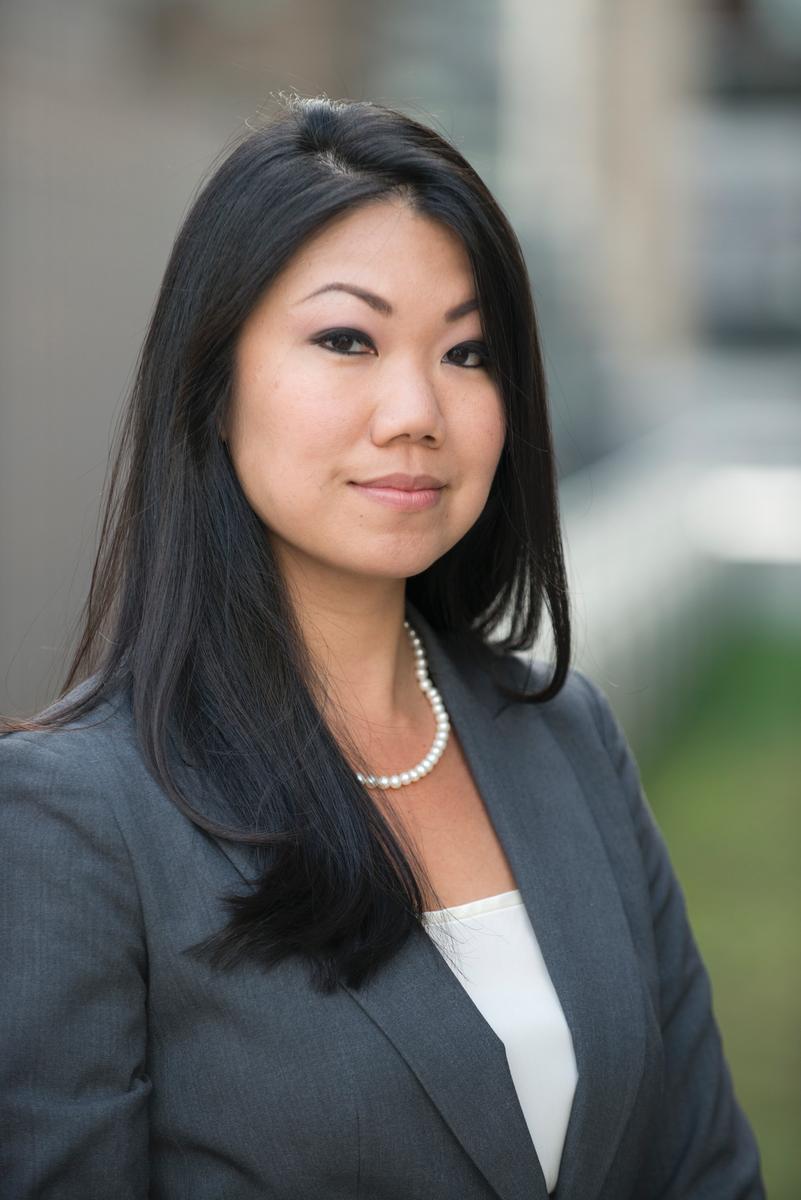 While the exclusion of gag orders promotes an ideal environment for evidence and witness investigation, Lau (left) contends that it leaves the door open for a “defamation campaign” intended to “prejudice” others against the person in question.
While the exclusion of gag orders promotes an ideal environment for evidence and witness investigation, Lau (left) contends that it leaves the door open for a “defamation campaign” intended to “prejudice” others against the person in question.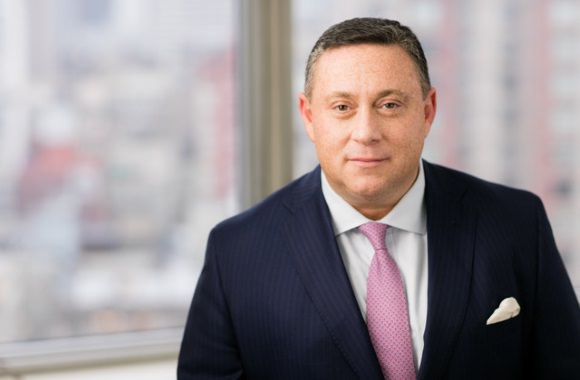




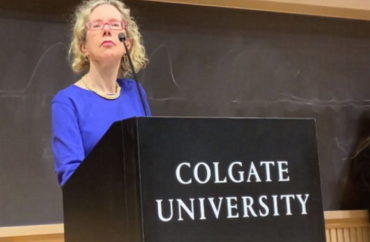 Heather Mac Donald stood at a Colgate University podium last Thursday night in front of a hostile, emotional audience who barraged her during a Q&A with highly charged questions after she gave a speech there at the behest of the school’s Open Discussion Club.Mac Donald, author of “The Diversity Delusion: How Race and Gender Pandering Corrupt the University and Undermine Our Culture,” drew a protest of students who filled the auditorium making it so those open to the Manhattan Institute scholar’s views could not get in.
Heather Mac Donald stood at a Colgate University podium last Thursday night in front of a hostile, emotional audience who barraged her during a Q&A with highly charged questions after she gave a speech there at the behest of the school’s Open Discussion Club.Mac Donald, author of “The Diversity Delusion: How Race and Gender Pandering Corrupt the University and Undermine Our Culture,” drew a protest of students who filled the auditorium making it so those open to the Manhattan Institute scholar’s views could not get in.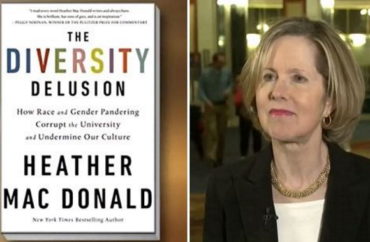 Perhaps the most tense moment of the evening took place when a woman took the mic to ask about campus rape culture, according to
Perhaps the most tense moment of the evening took place when a woman took the mic to ask about campus rape culture, according to 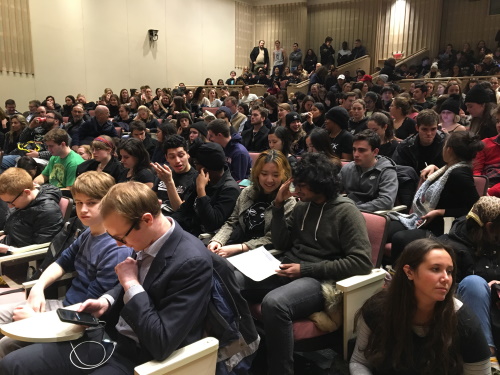 The activists had planned what they called a “nonviolent” protest in which participants first held a sit-in in the lobby leading to the lecture hall. For those who ventured into the talk, they “can be fully engaged in the speaker (though you probably won’t want to) or take out headphones, read their book, do homework, to disengage as the speaker is talking,” according to a copy of the protest email obtained by The College Fix.
The activists had planned what they called a “nonviolent” protest in which participants first held a sit-in in the lobby leading to the lecture hall. For those who ventured into the talk, they “can be fully engaged in the speaker (though you probably won’t want to) or take out headphones, read their book, do homework, to disengage as the speaker is talking,” according to a copy of the protest email obtained by The College Fix.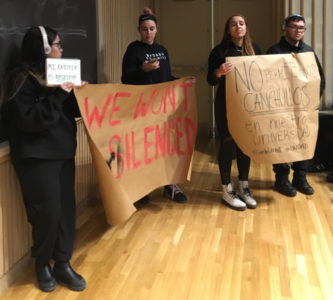 Mac Donald described the protesters’ suggestion to effectively cover their eyes or ears during her talk as “a stunningly apt emblem of the campus left’s rejection of dialogue.” She said many questions she fielded were from a cheat sheet of her writings prepared by protest organizers.
Mac Donald described the protesters’ suggestion to effectively cover their eyes or ears during her talk as “a stunningly apt emblem of the campus left’s rejection of dialogue.” She said many questions she fielded were from a cheat sheet of her writings prepared by protest organizers.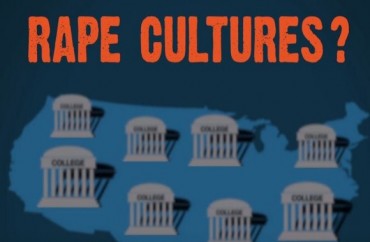 She continued that such a “sexual holocaust,” if it were really going on, would prompt a stampede of women away from college campuses, yet the opposite is true, females are now the majority on them.
She continued that such a “sexual holocaust,” if it were really going on, would prompt a stampede of women away from college campuses, yet the opposite is true, females are now the majority on them.
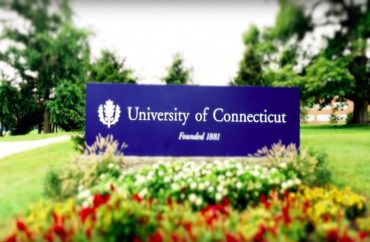 State’s lawyer repeatedly gets facts in the record wrong
State’s lawyer repeatedly gets facts in the record wrong